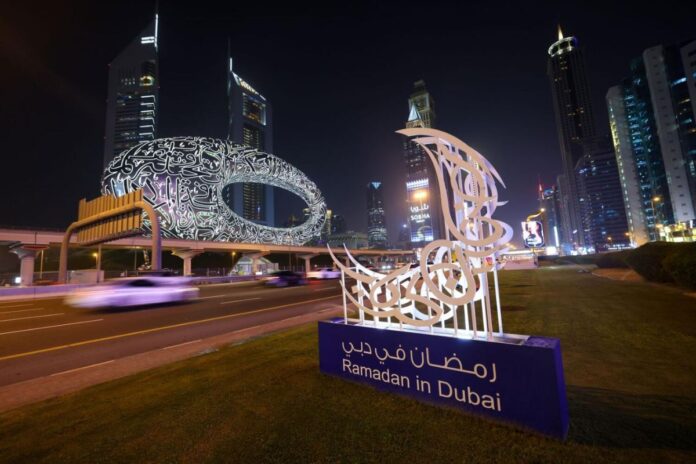An expert also outlined the weather forecast during the Holy Month, which falls in spring this year and includes possible rainstorms.
UAE residents are in for a treat this Ramadan with moderate spring temperatures and fasting hours that could last for 14 hours during the Holy Month, according to an Astronomy expert.
Ibrahim Al Jarwan, the Chairman of the Board of Directors of the Emirates Astronomy Society, spoke to Arabic Daily Emarat Al Youm.
He explained that the new crescent for Ramadan would be born at 21:23 pm on Tuesday, March 21 – which is after sunset – and that the next day it would be 10 degrees above the western horizon and set after 50 minutes.
This is why the first day of the month of Ramadan for the Hijri Year 1444 will likely start on Thursday, March 23, 2023, he told the paper, and Friday, April 21 is the expected the first day of Eid Al Fitr. The new crescent for the month of Shawwal, he explained will be born on Thursday, April 20 at 8:13 am and will be 4 degrees above the western horizon at sunset, which makes the next day the first day of Shawwal.
Fasting hours at the beginning of the Holy Month, from dawn to dusk, will be around 13 and half hours and will reach 14 hours and 13 minutes towards the end of the month, he told the paper.
With spring astronomically beginning on March 21, this will be a spring Ramadan he pointed out saying that next year Ramadan will be astronomically towards the end of the winter season.
Temperatures in Ramadan 2023, he told the paper, will range from 17 to 35 degrees at the beginning of the holy month and will range from 17 to 36 degrees toward the end of the month.
The “Al Sarayat” spring weather disturbances might also occur during the month of Ramadan causing heavy thunder rains.
During Ramadan, Muslims fast from sunrise (Fajr) to sunset (Maghreb). There are two main meals during the month – Suhoor, taken before sunrise, and Iftar, the day’s first meal after sunset. Fasting is one of the five pillars of Islam, and it’s an obligatory practice for all Muslims who can carry out the fast. In addition to abstaining from food and drink during fasting hours, Ramadan is also a month of disciplining oneself, reflecting, and creating positive spiritual habits.
Restaurants are open during Ramadan, but eating and drinking in public are not permitted.
It is worth noting that Ramadan is a month of worship, so in addition to fasting the day, many Muslims spend their time during the month reading the Quran and offering additional prayers such as the Taraweeh (after Isha prayers) or Tahajud (the late night before Fajr prayers). Religious practices usually increase during the last 10 days of the month, which are considered the most important 10 days of the month.
Ramadan is usually either 29 or 30 days, and a moon-sighting committee determines the start and end of the month. Working hours during the holy month are reduced, and school days are shorter.
News Source: Khaleej Times
